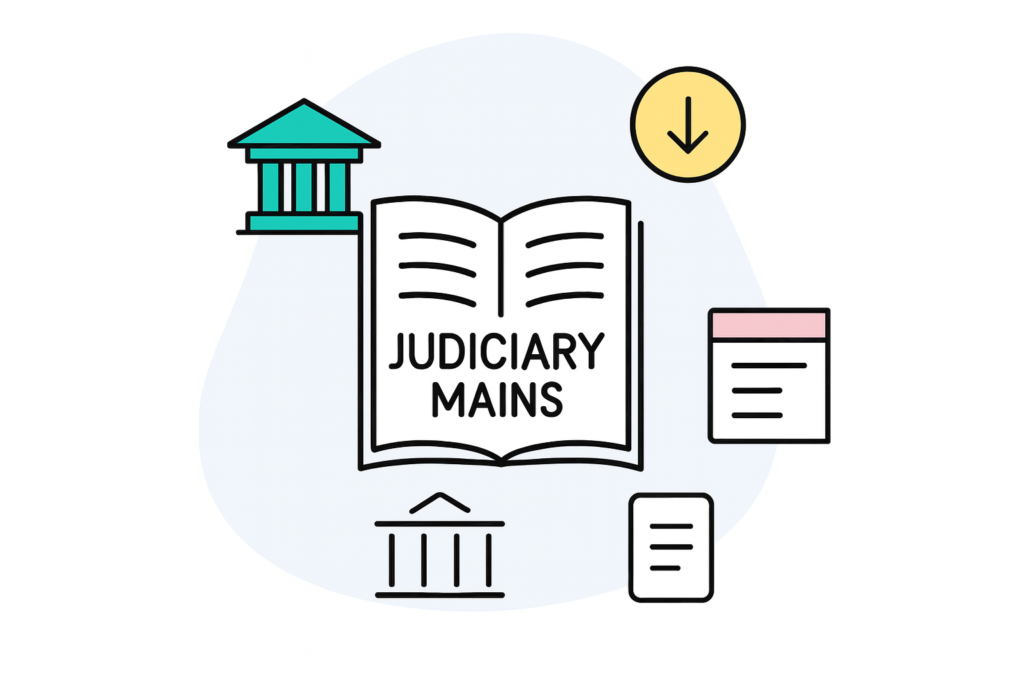Effective note-making is the backbone of successful preparation for the Judiciary Mains Exam. With a vast syllabus to cover, it’s easy to feel overwhelmed. However, by creating concise and well-organized notes, you can transform the way you study.
This blog will introduce you to game-changing strategies for creating exam-ready notes that will enhance your understanding and retention of key concepts. By applying these techniques, you can boost your preparation and build confidence for the Judiciary Mains Exam.
1. Understand the Syllabus & Exam Pattern

Before you even pick up a pen, take a deep dive into the syllabus and exam pattern. Knowing what topics to prioritize will save you tons of time and energy! Map out the key subjects and subtopics, this will help you organize your notes in a strategic way.
2. Use a Structured Format for Clarity
To keep your notes neat and efficient, organize them in a structured format.
- Use headings and subheadings to categorize information.
- Break down concepts into bullet points for quick digestion.
This method will make revising easier and faster, helping you pinpoint key points in no time!
3. Focus on Core Concepts and Legal Principles
Get to the heart of the matter! When making notes, concentrate on core concepts, legal principles, and landmark judgments. Don’t just rote memorize, understand and summarize in your own words.
- Example: Instead of just noting the name of a case, explain why it matters and its significance to your topic.
4. Integrate Case Laws and Illustrations
Spice up your notes with relevant case laws and examples that illustrate the concepts. These will enhance your understanding and provide you with ready references for your exam answers. Remember: Real-life examples make your notes and answers stand out!
5. Summarize Lengthy Passages for Simplicity

Let’s face it: Lengthy topics can be overwhelming! But don’t worry, simplify them by summarizing complex ideas into concise, easy-to-understand study notes.
- Use your own words to capture the essence of the content and ensure better retention.
6. Highlight Key Points & Keywords
When revising, your notes should be color-coded and highlighted with key terms and important points. This is a great visual aid and will help you quickly locate vital information when under time pressure during exams.
7. Create Diagrams & Flowcharts to Visualize Concepts
Visual aids like diagrams, flowcharts, and mind maps can transform complex concepts into easy-to-understand visuals. They not only make the content more engaging but also help in retaining the information.
- Pro Tip: For constitutional law, draw a flowchart of articles and their interconnections, it makes all the legal jargon seem much easier!
8. Regularly Update Your Notes with Latest Developments
The law is always evolving, Make it a habit to update your notes with the latest amendments, case laws, and judicial pronouncements. Keeping your notes current ensures you’re not caught off guard by recent changes.
9. Practice Answer Writing with Your Notes
Your notes are not just for reading, use them to practice writing answers! This will help you refine your answer-writing skills and ensure you can apply what you’ve learned in a structured, logical way during the exam.
10. Review and Revise Like a Pro
The secret to success? Repetition! Regularly review your notes to strengthen your memory. Revising frequently will ensure that you retain information for the long haul. Whether it’s once a week or every day, make revision a part of your routine.
Example: Making Notes on Constitutional Law

Here’s how you can create powerful notes on a complex subject like Constitutional Law:
Chapter: Fundamental Rights
- Introduction
- Definition and significance of Fundamental Rights.
- Classification: Justiciable Vs Non-Justiciable Rights.
- Article 12-35: Overview
- Article 12: What constitutes the State?
- Article 13: Laws inconsistent with Fundamental Rights.
- Specific Rights
- Article 14: Right to Equality
- Case: Maneka Gandhi Vs Union of India
- Article 19: Right to Freedom
- Restrictions & Sub-clauses
- Article 21: Right to Life and Personal Liberty
- Expanded interpretation in Puttaswamy case (Right to Privacy)
- Article 14: Right to Equality
- Case Laws & Landmark Judgments
- Kesavananda Bharati Vs State of Kerala (Basic Structure Doctrine)
- Golaknath Vs State of Punjab (Supreme Court’s power to amend Fundamental Rights)
- Recent Developments
- Updates on constitutional amendments and current judicial pronouncements.
Conclusion: Get Ready for Exam Success!
Success in the Judiciary Mains exam doesn’t just come from studying hard, it comes from studying smart! Feeling unsure about your answer-writing? 🤔 Let the experts at Edzorb Law help you fine-tune your responses! We can provide personalized feedback to help you score higher.
Now, you’re ready to rock the judiciary mains with effective note-making that sets you apart! 🚀 Best of luck, go ace it!

 Podcast
Podcast







 Features
Features






